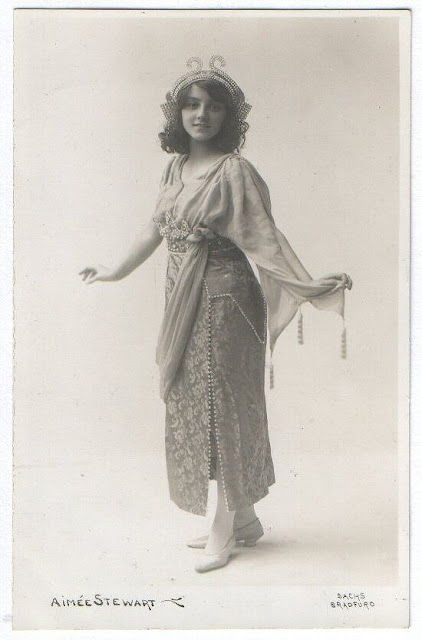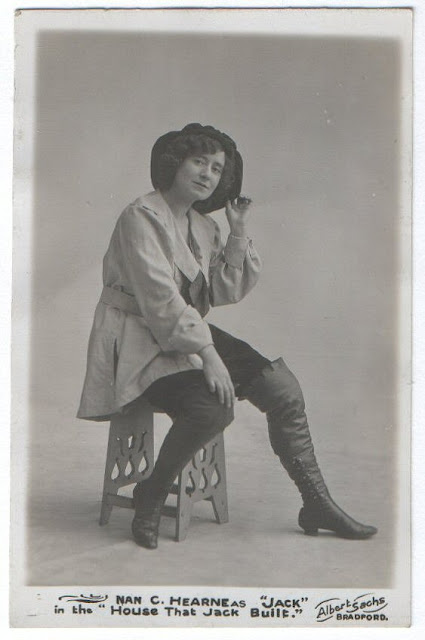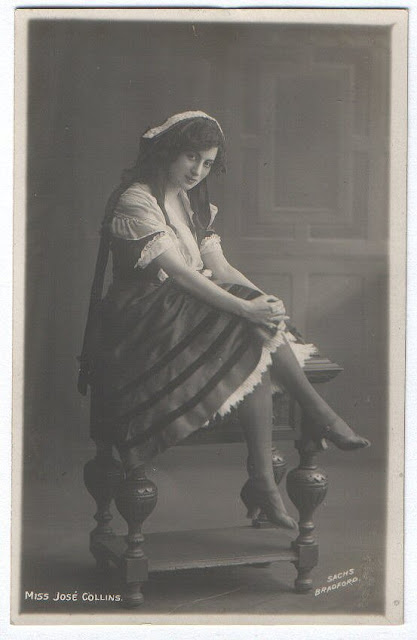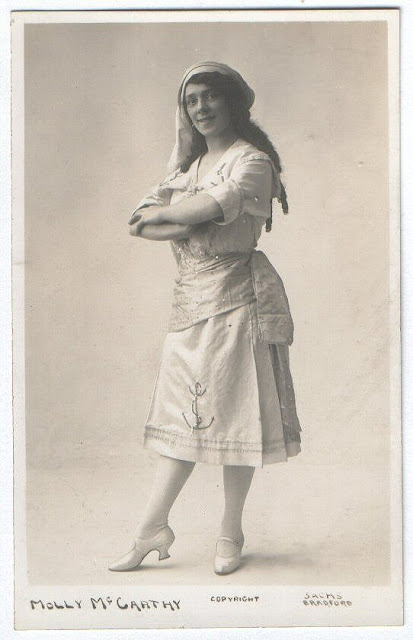#theatrical history
All pictures are of Bradford music hall artistes taken between 1900 and 1920
In a 1913 anonymous ‘autobiography’ was published, claiming to be the confessions of an Victorian music hall dancing girl, born in 1887 in Camden.
Although probably entirely fictional, the memoirs make tame reading. Apart from a trip to Spain, where the dancer is besieged by love sick 16-year-old Jose, there’s not a hint of loose behaviour. The main confession of this dancing girl is that theatrical life is actually a bit dull.
When she isn’t resting between jobs the dancing girl is enduring the “ordeal” of the music hall audition circuit, which sounds rather like a sinister Edwardian version of Britain’s Got Talent:
“Have you ever seen the crowd of anxious-looking women and girls waiting at the stage door of a theatre when the management has advertised for chorus ladies…a throng of expectant girls before the rehearsals of pantomimes, standing in the cold and rain of the dingy doors of the suburban or East-end theatres? More than once have I been one of those crowds.”
“One by one the aspirants for stage glory go before the brisk stage-manager, who is often too harassed and busy to appear polite or sympathetic “Let me try your voice/ Where’s your music?
"The trembling girl begins to sing at the piano. Perhaps by the end of the first verse the manager holds up his hand, and says “Thanks, that will do. I’m afraid you can’t sing well enough. Next please.
”…When you enter the theatre you find a crowd of artistes of all sorts on the stage. Some are already dressed and made up to go on. Everyone looks nervous. There is no joking or laughter; the performers talk in low tones in corners. In the dressing-room a number of girls and women are making up their faces.
“There is a faded woman, with dyed hair, trying to impart to her wan cheeks the bloom and attraction of youth with the aid of rouge, eyebrow pencils and powder. There are young girls who have never appeared on the stage. Some of these are in an agony of nervous fear, while others are absurdly confident of success.
"The room is overcrowded and close. There is a smell of grease paints and powder. One girl has forgotten her rouge; another has to run out and buy safety pins…The old hands are soon ready for the turn, and they go out on the dark stage and sit on any box or seat that is lying about the place. Meanwhile the stage manager is writing down names:
'Miss Nicely, are you there?’
The young lady clad in the tights and jewels of the 'principal boy’ comes forward smiling.
'You go on third, remember…Where are the Brothers Sleight?’
"Two knockabout comedians, in red wigs and quaint attire answer to the name. Then the gas is turned on and the footlights glitter, and, peeping from the wings, you see the directors taking their places in the stalls. They are a very ordinary collection of English gentlemen well-dressed and most elderly; but they appear awfully imposing, like a row of stern judges…
"The first turn is perhaps a conjurer; he is followed by a comic singer, and then I go on with three other girls, and we give our acrobatic 'number’. It is a terrible time. There is no applause, not a sign of approval from the keen-eyed gentlemen in the stalls. We come off hot and panting, wondering whether we have satisfied the directors. I peep from the wings and see the gentlemen talking about us. How I long to know our fate.”
From: Anon, The Confessions of a Dancing Girl By Herself (Arden Press, 1913).
In the 1910 story the Phantom of the Opera, the plot partly involves romantic lead Raoul de Chagny attempting to romantically pursue his childhood friend, the Swedish soprano Christine Daaé, not knowing that she has her own problems going on with the titular masked murdered in the basement at the moment. When she declines Raoul’s advances, he decides to keep pressing her anyways, only to flip out when he hears her talking to a man in her dressing room (the Phantom), where upon Raoul flips out, and goes on at length about how promiscuous Christine must be to turn him down and implictly accept the advances of some other dude.
Now, from a 2020′s perspective Raoul’s entitled, misogynistic behaviour is itself very crappy, but when seen in the historical context young women in the Paris Opera were treated in the period the story is based.. It kind of becomes worse?
See, a lot of young women entering into the Opera Garnier were themselves from poorer backgrounds, which meant that many were pressured either by their own economic circumstances or their parents to get a patronage from one of the many rich men, known as abonné, who happened to treat their season tickets as in much the same way that Donald Trump treated the Miss Universe pageants. Which is to say, they would all sit in the ballerinas practice area to watch them rehearse and get changed.

Y’know, like creeps.
These abonné had a reputation for stalking the ballerinas and pressuring them for sex, and because misogyny in the entertainment industry is sadly a constant, many came to see the fact that young women were being pressured into relationships with rich older men in exchange for “patronage“ as being a result of the moral failings of the young women themselves rather than the people choosing to exploit them.
Now, this state of affairs wasn’t some obscure, hushed up secret that was swept under the rug, painter Edgar Degas was noted as having used the ballerinas of the Paris Opera and their creepy patron as subjects in his art, while author Émile Zola also wrote stories about them as well. Additionally, as a theatrical critic and journalist who had an extensive knowledge of the behind the scenes goings on the the Opera Garnier Gaston Leroux more than likely knew about the situation as well…
So, with this context in place, it can be inferred that while Raoul himself may have been attempting to pursue Christine romantically, his assumption that Christine was sleeping with someone else may have been based in his presumption that his orphaned former friend was engaging in a form of sex work to support herself… Which in Raoul’s mind made Christine a bad person?
Now, it should be noted that within the context of the story, Gaston Leroux doesn’t particularlty seem to like Raoul that much (his sympathises and characterisation are reserved for the Phantom, Christine, and the Persian ex-policeman that’s absent from a lot of later adaptations). So his depiction as a entitled, misogynistic weenie may have actually been on purpose, particularly in light of how the story is structured as Leroux constructing the story in-universe from interviews, police reports and such.
Post link





